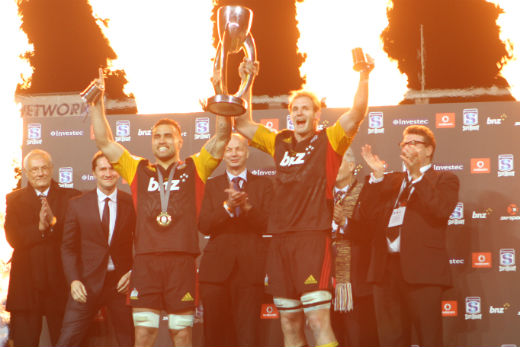A refreshed Super Rugby competition is set to be unveiled from 2016 with predictions it holds the best chance of ensuring premier international provincial rugby continues.
The expanded competition will feature the 18 teams – three more than the current 15 teams which is made up of five each from South Africa, Australia and New Zealand.
Chiefs' co-captains Liam Messam and Craig Clarke lift the Super Rugby title after defeating the Brumbies in 2013.
The new teams will comprise of one new team each from South Africa and Argentina and one selected via a competitive tender. Teams will play in one of four conferences split evenly into two regional groups – the Australasia Group and the South Africa Group.
New Zealand Rugby Chief Executive Steve Tew says the expansion ticks all the boxes in Super Rugby remaining a competitive, entertaining and commercially viable competition, one players enjoy being part of.
'This is the best option to evolve what is already a fantastic competition and one that continues to deliver for fans, teams, players and sponsors,” says Steve.
'From a player point of view it was important that we managed the travel of the teams. We needed a platform that ensured our best players could continue to perform at their peak. Equally keeping South Africa in the regular competition was an important part of what makes Super Rugby.
'With a later start and one less match for each team in the competition, we believe we have got the balance right. We also believe we have a competition that will continue to feed a winning All Blacks team.
Steve says from a fans' perspective, there will still be plenty of derbies to enjoy as well as top rugby from the best players in the world.
The new structure has been approved and confirmed by all SANZAR nations and Argentina following a thorough consultation and negotiation process with national Unions, Super Rugby organisations and teams and will now form the basis for negotiations with the competition's broadcast partners.
Chiefs Rugby Club Chairman Dallas Fisher welcomes the new format and says the changes are a natural evolution of the competition, while at the same time keeping the best elements of the existing format.
'We know that fans love the New Zealand derby matches so it's great to see they have been retained. At the same time we know that innovations are important if we want to see Super Rugby grow,” says Dallas.
Rugby Players Association chief executive Rob Nichol says the proposal is the best of the options put forward given the complexity of issues, and number and location of teams involved.
'While recognising there is still some work to do around the new teams, draw logistics and commercialisation we support its presentation to the broadcasters and fans,” says Rob.
'We feel that in taking the time to fully comprehend it they too will appreciate the subtle aspects of what is ultimately a practical compromise, and quite exciting prospect, for all involved.”
The competition
- Expanded competition to 18 teams from 2016 – South Africa 6th, Argentina, plus new team
- Shorter competition – from 21 weeks to 20 weeks
- All teams play one less match in a regular season – from 16 matches to 15
- Four conferences playing in two regional Groups – South Africa and Australasia
- The Australasia Group made up of two conferences – Australia (five teams) and New Zealand (five teams)
- South African Group made up of two conferences – South Africa 1 (three teams plus one from Argentina), and South Africa 2 (three teams plus the 18th team)
- Each team plays 15 regular season matches – eight home/seven away or vice versa every second year
- A total 135 regular season matches and seven Finals Series matches (compared to 120 and five)
The Finals Series: eight contenders, three weeks
- Playoff format features an eight-team knock-out Finals Series playing in a quarters, semis and final format
- Five teams qualify from the Australasia Group, three teams from the South Africa Group
- All four conference winners automatically advance to Finals Series
- The next three highest ranked teams in the Australasia Group and the next highest team in the South Africa Group, will make up the wildcard contenders, and also advance to the Finals Series



0 comments
Leave a Comment
You must be logged in to make a comment.